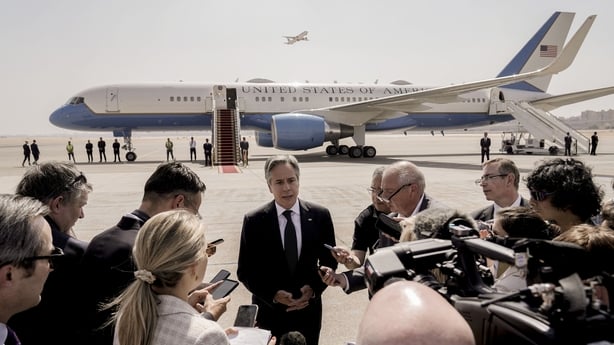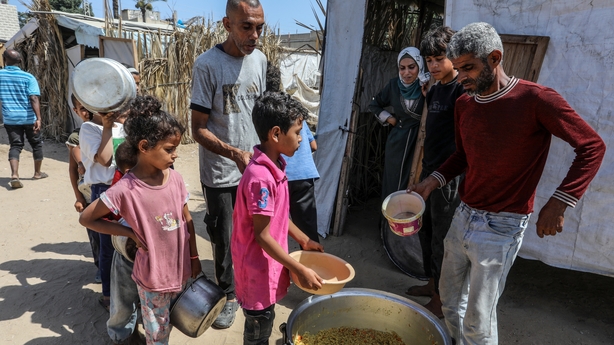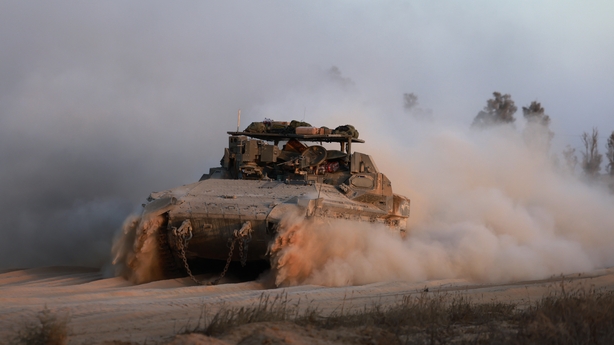The UN World Food Programme has suspended the delivery of aid to Gaza via a temporary US military pier in order to assess the security situation, a spokesperson has said.
Stephane Dujarric linked the move to an Israeli hostage rescue operation over the weekend that freed four people, but which health officials in Hamas-ruled Gaza say killed 274 people and wounded almost 700, many of them women and children.
"World Food Programme colleagues tell us that we are temporarily pausing operations at the floating dock until a thorough assessment of the security situation is conducted to ensure the safety of our staff and our partners," said Mr Dujarric, spokesperson for the UN secretary-general.
"We've all seen what happened in Gaza over the weekend. We've seen some of the media reports. We've also taken note of very public statements by the US Central Command that the floating pier had not been used in the operation by the Israeli forces regarding the hostages," he said.
"I think it's only normal after such an operation takes place with such a large number of victims, that our humanitarian colleagues take a pause, look at the situation. And hopefully it can be returned to use as quickly as possible from our end," Mr Dujarric added.
Pentagon spokesman Major General Pat Ryder told journalists that the Israeli operation took place near the temporary pier, but was completely separate from the aid delivery effort and its equipment and personnel.
"We'll continue to work closely with USAID, World Food Programme, the Israelis and all the stakeholders when it comes to ensuring ... security is taken into account," Mr Ryder said.
He also said that high seas had again disrupted the delivery of aid via the pier, only shortly after shipments resumed on Saturday following repairs to the structure from storm damage it suffered last month.
"The sea states ... yesterday and today have prevented additional aid from flowing across the causeway, but all indications are that that will commence again tomorrow," Mr Ryder said.
Gaza has been devastated by Israeli operations against Palestinian militant group Hamas that are now entering their ninth month, uprooting the coastal territory's population and leaving them in dire need of humanitarian assistance.
Meanwhile, US Secretary of State Antony Blinken has blamed Hamas for holding up a ceasefire in Gaza, as the top US diplomat conducted a Middle East peace mission to deliver President Joe Biden's latest proposed plan to end the Gaza war.
We need your consent to load this rte-player contentWe use rte-player to manage extra content that can set cookies on your device and collect data about your activity. Please review their details and accept them to load the content.Manage Preferences
Speaking after meeting Egyptian President Abdel Fattahal-Sisi in Cairo, Mr Blinken said Hamas was the only side that had yet to agree to Mr Biden's proposal, which Washington says already had Israel's backing before Mr Biden announced it on 31 May.
Washington says its proposal envisions a ceasefire in stages, ultimately leading to a permanent end to the war. But Israel still says it will agree only to temporary pauses until Hamas is defeated, while Hamas says it will not accept a truce without guarantees that the war will end.
"My message to governments throughout the region, to people throughout the region, is - if you want a ceasefire, press Hamas to say 'yes'," Mr Blinken told reporters before leaving for Israel where he met Prime Minister Benjamin Netanyahu.

Senior Hamas official Sami Abu Zuhri told Reuters Mr Blinken's comments were "an example of bias toward Israel and it offers American cover to the holocaust conducted by the occupation in Gaza".
In his talks with Mr Netanyahu this evening, the US State Department said Mr Blinken had emphasised the importance of a post-war plan in Gaza as well as the need to prevent the conflict from spreading.
The war has now entered its ninth month, since Hamas-led fighters killed 1,200 people and took some 250 others hostage in a rampage through southern Israel. Israel's assault on Gaza has killed more than 37,000 Palestinians and reduced most of the enclave to wasteland.
Ahead of Mr Blinken's trip, his eighth to the region since the start of the war, Israel and Hamas both doubled down on hardline positions that have scuppered all previous attempts to end the fighting, while Israel has pressed on with assaults in central and southern Gaza, among the bloodiest of the war.
"We are committed to total victory," Mr Netanyahu said in a statement released by his office, quoting remarks he made yesterday to relatives of Israelis killed in Gaza. He said he would reject a Hamas demand to "commit to stopping the war without achieving our goals of eliminating Hamas".
Hamas and its allies Islamic Jihad said in a joint statement: "Any agreement must ensure a permanent end to the aggression and a complete withdrawal from the Gaza Strip, reconstruction, lifting the blockade and a serious swap deal."
In Rafah, the city on the southern edge of Gaza where Israel launched an offensive last month, residents said tanks had been thrusting deeper towards the north in the early hours of the morning. They were on the edge of Shaboura, one of the most densely populated neighborhoods at the heart of the city.
Around half of Gaza's 2.3 million people had been sheltering in Rafah before last month's assault, and a million have since fled again.

Since last week, Israel has also launched a large assault in central Gaza, around the small city of Deir al-Balah, the last population centre yet to be stormed. Residents said the Israelis had pulled back from some areas there but were keeping up air strikes and shelling.
Residents in Nuseirat, north of Deir al-Balah, were still clearing debris after Israel freed four hostages in a massive raid there on Saturday. Palestinian officials say 274 people were killed, making it one of the deadliest assaults of the war. Israeli forces said they were aware of under 100 Palestinians killed there and did not know how many were combatants.
"We are exhausted and helpless, enough is enough," said Jehad, who fled under fire from Saturday's assault in Nuseirat with his family and was now in Deir al-Balah, speaking by text message. The family had already been displaced from Gaza City to Nuseirat, to Khan Younis, to Rafah and back to Nuseirat before their latest flight.
In video obtained by Reuters from Nuseirat, resident Anas Alyan, standing outside the ruins of his home, described how Israel commandos wearing shorts had appeared in the streets, firing wildly while F-16s and quadcopters fired from the air.
"Anyone moving in the street was killed - anyone moving, or walking, was killed immediately," he said.
"There are still children under this building. We don't know how to pull them out," he said, pointing to one ruin.

After months of failed peace efforts, Mr Biden chose a new tack with his public announcement on 31 May of a ceasefire proposal. US officials say Mr Biden unveiled it without asking the Israelis first, to increase pressure for a deal.
What is different this time is that Israeli forces have now stormed most territory inside Gaza at least once, and Mr Netanyahu is under greater domestic political pressure to reach a deal.
Benny Gantz, a popular centrist former military chief, quit Israel's war cabinet yesterday over what he described as the failure to outline a plan for the war's end. That leaves Mr Netanyahu more reliant on far-right allies who threaten to bring down his government if he agrees a deal leaving Hamas unvanquished.

